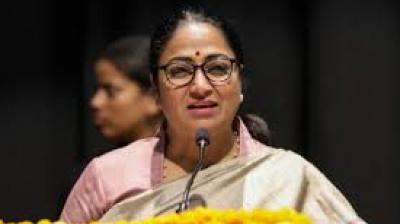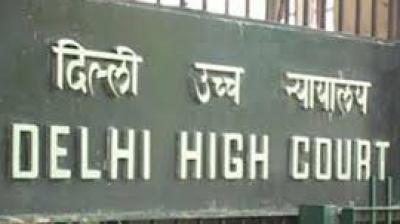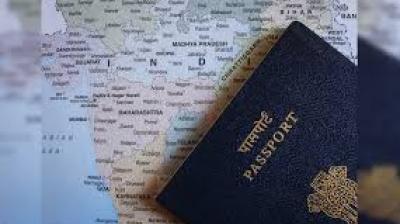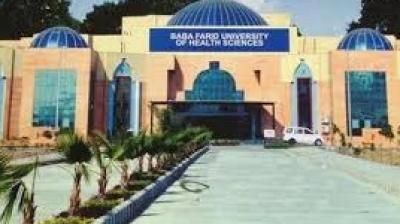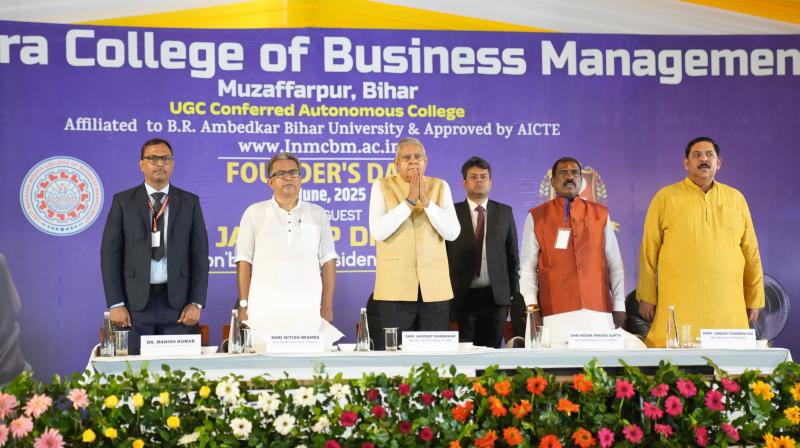
“Bihar was once the global center of learning — Nalanda, Vikramshila, and Odantapuri — these were not just universities, but civilizations.
Bihar is the birthplace of India's philosophical foundation: Vice-President
The Vice-President of India, Shri Jagdeep Dhankhar, while recalling the glorious historical, intellectual, and constitutional legacy of Bihar, stated today: “This is not just a state, it is the soul of India — where the enlightenment of Buddha and Mahavira, the resistance of Champaran, and the constitution-building by Dr. Rajendra Prasad, all converge on the same land.”
Speaking on the historical background of the state, Shri Dhankhar said,
“We often listen to the mind and the heart, but we must also listen to the soul. Bihar’s land is an inspiration for this. It is here that Buddha attained enlightenment, and Mahavira achieved spiritual awakening — this land is the birthplace of India's philosophical foundation.”
He added, “Bihar is the land where ancient knowledge, social justice, and modern aspirations coexist. The story of Bihar is the story of India — and this is the journey that will earn India global recognition. When we talk about independence, we must mention the Champaran Satyagraha, which took place on this sacred land of Bihar. In 1917, Mahatma Gandhi launched his first Satyagraha movement in Champaran. He turned the issue of farmers into a national cause. Champaran not only challenged colonial injustice but also introduced a new grammar of governance — based on truth, dignity, and fearless service.”
Addressing a public gathering at the foundation day ceremony of Lalit Narayan Mishra College of Business Management in Muzaffarpur, Bihar, Shri Dhankhar said,
“Bihar was once the global center of learning — Nalanda, Vikramshila, and Odantapuri — these were not just universities, but civilizations. In the 5th century, Nalanda was a residential university where people from China, Korea, Japan, Tibet, and Central Asia came to gain knowledge. It housed 10,000 students and 2,000 teachers. These institutions will always inspire us — to remember where we came from and where we must go. Even if Oxford, Harvard, and Cambridge are combined, they cannot match Nalanda.”
Speaking about the barbaric attacks by foreign invaders on Nalanda, he said,
“Around 1192, Bakhtiyar Khilji burned down the Nalanda University library, and it kept burning for months. Yet the flame of knowledge was never extinguished — India remains the greatest knowledge reservoir in the world. The roots of modern science lie in our ancient traditions.”
Appreciating the vision of Dr. Lalit Narayan Mishra and Dr. Jagannath Mishra, he said,
“This college has received a special status from the UGC — being an autonomous college, this recognition is a major achievement. I congratulate everyone associated with this institution — it is the result of collective effort by the faculty and students.”
Discussing the National Education Policy 2020, he stated,
“The Vedic principle says — ‘Sa Vidya Ya Vimuktaye,’ meaning true knowledge is that which liberates. In our country, education has always been value-based. At no point has it been commercialized or treated as a commodity. Our education system builds character and connects us with life values. I appreciate today’s theme — ‘Indian Knowledge Tradition and the Vision of National Education Policy 2020.’ It is a topic of deep importance, capable of making a decisive impact, and will help shape our democratic framework and development path. The objective of NEP 2020 is to create skilled professionals, contented citizens, employment generators, knowledgeable humans — and to build an India that truly reflects our collective aspirations.”
Highlighting the role of Bihar’s son Dr. Rajendra Prasad, he said,
“When the Somnath temple was inaugurated, India’s first President and son of this soil, Dr. Rajendra Prasad, carried it out with resolve, despite opposition. Just as he stood firm in the Constituent Assembly, he remained unwavering here as well. The Constituent Assembly saw debates, dialogues, and reflection — but never disruption. That is the essence of democracy.”
He added, “Dr. Rajendra Prasad and Dr. Ambedkar together set the highest standards in constitution-making. Today, as the country’s first tribal woman President, Smt. Droupadi Murmu carries forward that legacy — it is the continuity of Bihar’s spirit.”
Emphasizing social justice, Shri Dhankhar said,
“I am fortunate to have been a minister at the Centre when the Mandal Commission was implemented. And today, as Chairman of the Rajya Sabha, it is a proud moment to witness Karpoori Thakur Ji being honored with the Bharat Ratna. Bihar’s contribution to the foundation of social justice is indelible.”
Referring to the Emergency, he remarked,
“June 25 — this date marks the darkest chapter of Indian democracy. The Constitution was murdered. At that time, it was Bapu Jayaprakash Narayan who lit the flame of democracy. The ‘Total Revolution’ was not just a political movement — it was a call for national reawakening.”
The event was attended by Bihar's Industry Minister Shri Nitish Mishra, Vice-Chancellor of Ambedkar University, Muzaffarpur, Professor Dinesh Rai, Director of L.N. Mishra College Shri Manish Kumar, among others.
(For more news apart from “Bihar is the birthplace of India's philosophical foundation: Vice-President,” stay tuned to Rozana Spokesman.)



